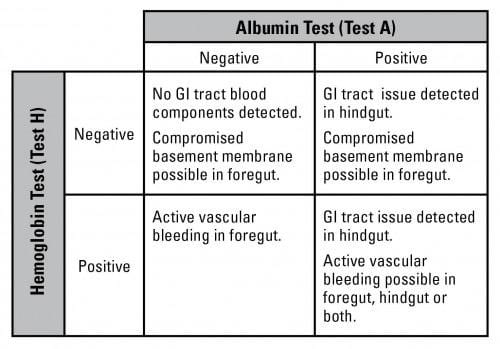Home > What Does the SUCCEED Equine Fecal Blood Test Do?
What Does the SUCCEED Equine Fecal Blood Test Do?
The SUCCEED Equine Fecal Blood Test allows veterinarians to begin the diagnostic process by ruling in digestive disease right away when a horse is underperforming, resisting training or showing clinical signs of a digestive problem. Perhaps most importantly, it accurately detects inflammation or lesions in a horse’s hindgut – which previously could only be seen definitively during surgery or at post mortem.
What the SUCCEED FBT Tests For
When the mucosal lining of the horse’s gastrointestinal tract is compromised by inflammation or ulceration, it will typically bleed or seep protein into the gut. The SUCCEED FBT detects that blood loss and protein in a fresh fecal sample which can confirm the presence of GI tract disease.
Proprietary antibody technology in the FBT detects the presence of albumin and/or hemoglobin, proteins in blood, in a horse’s manure. Taken together, results for each test indicate the presence of gut damage and can help the veterinarian determine the general location.
Test A
Detects the blood component albumin, which indicates a source in the hindgut.
Test H
Detects hemoglobin, which detects blood loss from sources along the GI tract.
How FBT Results Guide Diagnosis
While the test itself is easy to use, understanding what to do with FBT results in light of a full diagnostic work-up requires the skills and knowledge of a trained and certified veterinarian.
Your veterinarian should understand that the FBT is highly sensitive–especially for detecting hindgut conditions–but not specific to identifying the exact pathology behind the condition.
Positive results rule in conditions, but negative results do not necessarily rule out problems – especially lower grade ulcers in the stomach. The FBT provides an initial screen to help guide your veterinarian’s next steps in the diagnostic process. Your veterinarian will combine the FBT results with other diagnostic tests and measures, such as the horse’s history, gastroscopy, blood work or others, for making a complete diagnosis.
Benefits of Testing First and Regularly with the FBT
Monitor ongoing digestive wellness.
The FBT provides a non-invasive and inexpensive way for your veterinarian to regularly evaluate a horse’s digestive wellness – catching minor problems before they become serious issues. It may also be used to monitor progress after surgery or during treatment for GIl conditions and other health problems that may impact gut health.
Detect gut issues earlier.
Some horses are stoic and don’t display the classic signs of digestive discomfort, while others may be suffering from low-grade hindgut inflammation that negatively impacts behavior and performance. The FBT is calibrated to detect true pathologies – but with the sensitivity to pick up subclinical hindgut issues early.
Diagnose problems more quickly and accurately.
Digestive disease in horses encompasses much more than just the commonly recognized gastric ulcers, including ulcers in the colon and other hindgut problems. Because the structure and function of the fore- and hinguts are very different, they require targeted, localized treatments to be most effective – and avoid further exacerbating issues. Accurate diagnosis is critical for restoring health.



